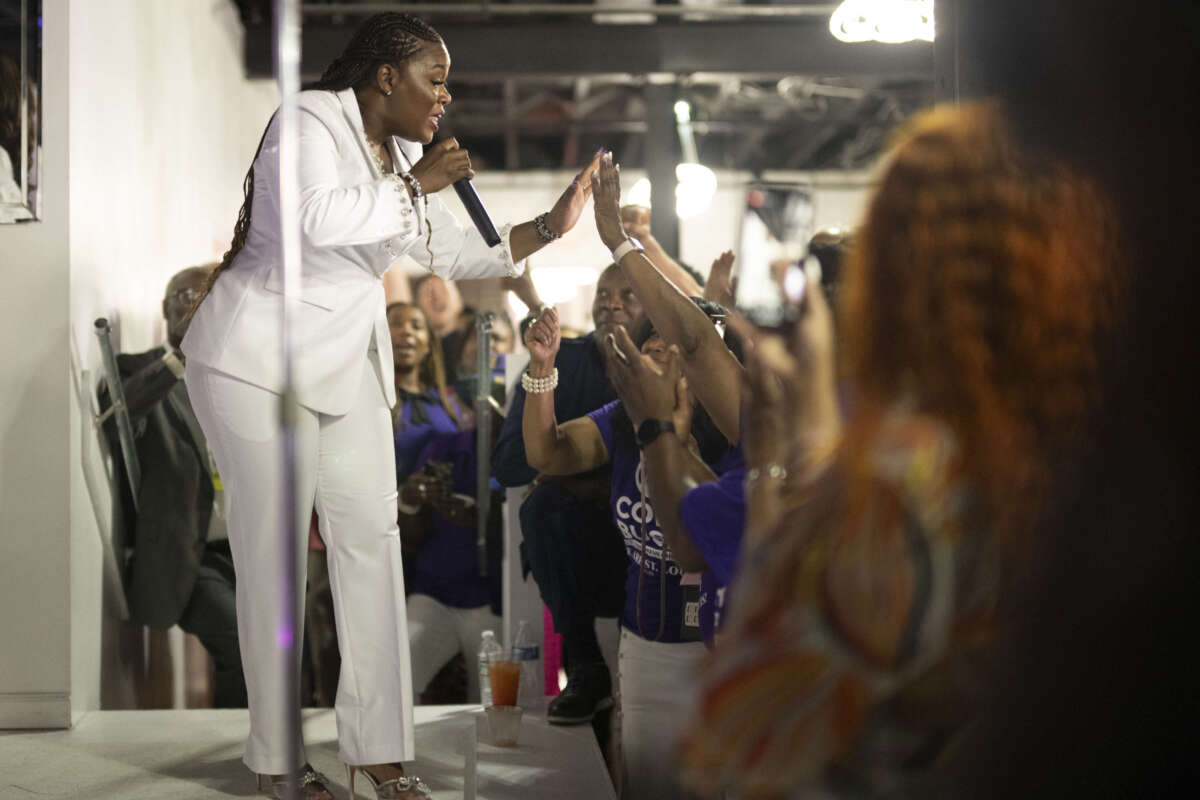Sen. Bernie Sanders (I-Vermont) and Rep. Alexandria Ocasio-Cortez (D-New York) have spoken out about corruption in politics following the defeat of Rep. Cori Bush (D-Missouri) in her primary this week by pro-Israel groups that poured millions of dollars into unseating the progressive lawmaker.
AIPAC’s super PAC, the United Democracy Project (UDP), spent $8.5 million on the campaign to oppose Bush, helping to make it the second-most expensive House primary in history — only beaten by Rep. Jamaal Bowman’s (D-New York) primary in June, in which UDP poured $14.5 million into electing a pro-Israel challenger to Bowman.
To many who championed the two lawmakers for speaking out against Israel, the two losses were a show of AIPAC’s outsized influence on elections and the ability for deep-pocketed interest groups to buy elections.
“AIPAC had to spend $8.5 million to get 51 percent of the vote to defeat Cori Bush,” said Sanders in a post on social media, suggesting that it took a monumental effort by such groups to defeat the lawmaker. Indeed, Democratic strategist Waleed Shahid has pointed out, UDP ended up spending $280 per vote against Bowman and Bush, having injected roughly $25 million into defeating them.
“Billionaires buying elections is not what this country is supposed to be about. We have to end Citizens United and super PACs and move to public funding of elections,” Sanders said.
Sanders has continually spoken out against Citizens United, and also called for the overturn of the monumental 2010 Supreme Court decision in June when Bowman lost his election. “It is an outrage and an insult to democracy that we maintain a corrupt campaign finance system which allows billionaire-funded super PACs to buy elections,” Sanders said at the time. “Big Money buys politicians who will do their bidding, and the results are clear.”
In an interview with CBS, Ocasio-Cortez also spoke out against the way that money in politics paves the way for corruption.
Bowman and Bush “spoke courageously on issues that are often very difficult to talk about in mainstream politics,” Ocasio-Cortez said. “And I think that is one of the reasons why they have earned so much support: Because they’re willing to put their careers on the line to advocate for the issues … and the viewpoints that they think are right.”
Ocasio-Cortez pointed out that money has an “enormous” influence on politics and even a candidate’s individual financial situation can play a role in their election.
“All of that money was spent against them by a big money system of super PACs and difficult to trace political contributions. That, to me, speaks to the corrupting role of our current campaign finance system and the fact that it is very hard to be a working class American that gets elected to office and stay in office,” the lawmaker said.
This not only impacts voices against Israel’s genocide and apartheid in Congress, but also those who support progressive policies; as Politico reported earlier this year, AIPAC is serving as a major driver of Republican donor money being used to meddle in Democratic primaries by funders who openly say that they want to ensure the most conservative candidates possible are elected to office.
When they lost, Bush and Bowman both vowed to continue to fight against the influence of AIPAC and other major operations seeking to push politicians to the right.
“AIPAC, I’m coming to tear your kingdom down,” said Bush in her concession speech. “And let me put all of these corporations on notice: I’m coming after you too. But I’m not coming by myself. I’m coming with all the people that’s in here, that’s doing the work.”
Press freedom is under attack
As Trump cracks down on political speech, independent media is increasingly necessary.
Truthout produces reporting you won’t see in the mainstream: journalism from the frontlines of global conflict, interviews with grassroots movement leaders, high-quality legal analysis and more.
Our work is possible thanks to reader support. Help Truthout catalyze change and social justice — make a tax-deductible monthly or one-time donation today.
